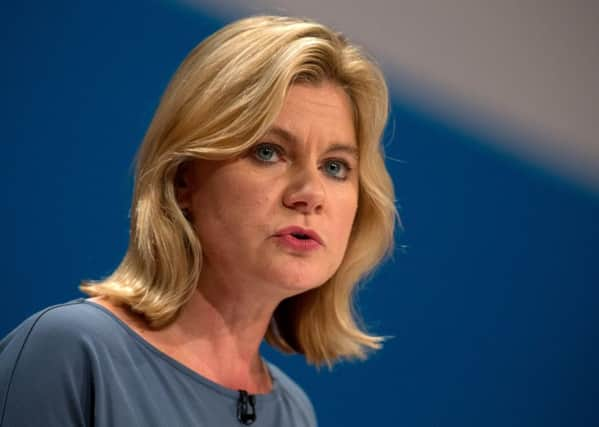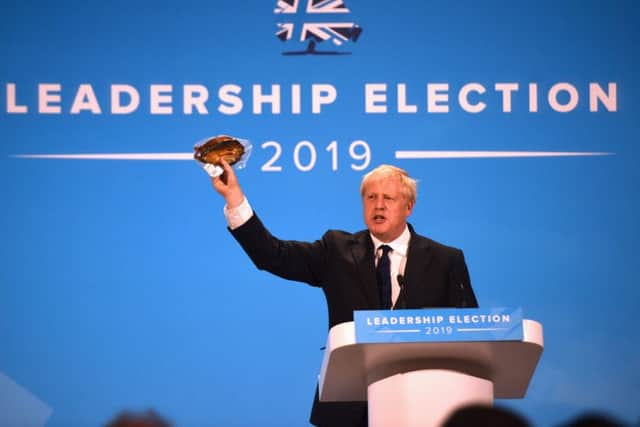Close Parliament over Brexit and you lose Britain – Justine Greening


A lot of readers of The Yorkshire Post would rightly be forgiven for thinking Parliament should work through the summer to sort out Brexit.
But not only did Government Ministers want to shut Parliament for the summer as normal, there were suggestions from both Boris Johnson and Jeremy Hunt that they might shut it down in the autumn too.
Advertisement
Hide AdAdvertisement
Hide Ad

For lots of MPs, me included, this wasn’t a sensible option I could support.
Parliament is gridlocked on Brexit and we’re not going to break that gridlock if it isn’t even open for business. The proposal to potentially shut down Parliament was massively flawed.
Advertisement
Hide AdAdvertisement
Hide AdFirstly, closing Parliament is no way for Government to win a debate on a Brexit deal. You win the debate by engaging with it, not by having no debate at all.


Secondly, this was no way to unite Britain on Brexit.
Thirdly, as MPs, we’re there to do a job – representing our communities and passing laws.
Are Ministers really saying that even if we have an international or national crisis, entirely unrelated to Brexit but requiring debate and decision, Parliament wouldn’t sit?
Advertisement
Hide AdAdvertisement
Hide AdFinally, shutting down Parliament in case it voted against a no-deal Brexit would have crossed a Rubicon and set a dangerous precedent.
Any future government, whether a majority gvernment or, as in this case, a minority government, would think it could do the same to avoid facing up to a Parliamentary defeat.
It’s a shabby way to treat our democracy, sidelining the very representatives that people have elected to represent them on this important issue and the many others that affect our daily lives.
It’s no way to run our country.
Advertisement
Hide AdAdvertisement
Hide AdFortunately, common sense won the day. Parliament voted to stay open as usual in the autumn, whether our next Prime Minister is Boris Johnson or Jeremy Hunt.
Britain must find a way to resolve Brexit.
A year ago, I predicted the Parliamentary gridlock that has ensued because, rightly or wrongly, in such a finely based Parliament whatever is proposed will have a blocking group of MPs against it. I’ve always understood that was a difficult message to convey to MPs – above all in my own party.
But I’ve learnt through life that you have fix problems by confronting and dealing with them, not pretending they’re not there.
As Prime Minister, Theresa May made some key mistakes.
She said ‘Brexit means Brexit’ but then negotiated a ‘worst of all worlds’ deal with Brussels that many Brexit voters thought simply didn’t deliver.
Advertisement
Hide AdAdvertisement
Hide AdShe and her Cabinet refused to accept defeat, even when her deal was overwhelmingly rejected by the Parliament in January and then twice again in March.
There has been real damage to our economy and Britain’s international reputation from the failure to find a route through on Brexit.
For all her qualities, Theresa May has paid the price, losing her premiership.
But making ambitious promises on Brexit that ultimately cannot be delivered remains a recipe for disappointment and political failure.
Advertisement
Hide AdAdvertisement
Hide AdAnd so is ignoring Parliamentary maths – in the end winning votes is a numbers game.
Britain’s next Prime Minister must learn from Theresa May’s mistakes if they’re not to repeat them.
Otherwise the same outcome is inevitable – continued Parliamentary gridlock and no route forward on Brexit.
Both Boris Johnson and Jeremy Hunt say they will try for a fresh deal with the EU.
Advertisement
Hide AdAdvertisement
Hide AdIf they fail to achieve that in the few short weeks before our October 31 deadline, they’ve pledged to take Britain out of the EU without a deal.
Yet Parliamentary votes have already expressed a clear rejection of that very approach.
For the time being, we seem to be set for a continued impasse on Brexit. Our country deserves better.
And the British people should resist any similar attempt from any future Government of any political colour to block their elected representatives from being able to go to a Parliament where they can do their job and speak up for their communities.
We will find a route forward on Brexit – we have to.
The Brexit limbo land cannot continue forever.
Advertisement
Hide AdAdvertisement
Hide AdBut once that is done, we have serious questions to ask as to how 21st century Britain ended up in a position where its Parliament was threatened with closure by a minority government because it might not agree to vote for what Ministers wanted.
We came far too close to crossing that Rubicon. It should give us all pause for thought.
Because whatever your view on Brexit, your Member of Parliament is there to represent you.
If they don’t, our democracy means you can vote them out and get a different one. But it starts and ends with them having a Parliament to speak in on your behalf in the first place.
Lose that, and we lose Britain.
Justine Greening is the former Education Secretary. Born in Rotherham, she is a Conservative MP.